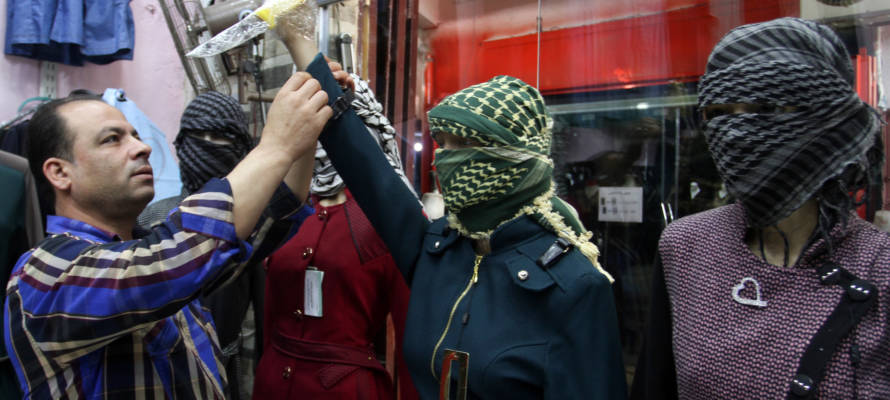Democrats are reportedly trying to convince the Palestinians to make salaries based on economic conditions and not just terrorism, said senior intelligence analyst Yossi Kuperwasser.
By Israel Kasnett, JNS
The incoming Biden administration has made clear it intends to renew funding to the Palestinian Authority and reopen the PLO mission in Washington, D.C.
In November, Vice President-elect Kamala Harris said in an interview, “We will take immediate steps to restore economic and humanitarian assistance to the Palestinian people, address the ongoing humanitarian crisis in Gaza, reopen the U.S. consulate in East Jerusalem and work to reopen the PLO mission in Washington.”
But how will that comport with the Taylor Force Act and the Anti-Terrorism Clarification Act (ATCA), which prohibit funding to entities that fund terrorism?
Jonathan Schanzer, senior vice president at Foundation for Defense of Democracies, said the incoming Biden administration “can certainly reopen the PLO mission unilaterally.”
He told JNS, however, that funding “could be complicated by congressional Republicans or even pro-Israel Democrats.”
He also warned against renewing funding for the U.N. Relief and Works Agency (UNRWA).
“Funding for U.N. organizations that promote Palestinian narratives or refugee narratives may come under similar scrutiny, and for good reason,” he said.
In 2018, U.S. President Donald Trump pulled funding from UNRWA due to corruption and its anti-Israel stance.
The Anti-Terrorism Clarification Act (ATCA) of 2018, and the Promoting Security and Justice for Victims of Terrorism Act (PSJVTA) of 2019 are two amendments to the Anti-Terrorism Act (ATA) that have significant implications for U.S. aid to the Palestinians and U.S. courts’ ability to exercise jurisdiction over Palestinian entities.
PSJVTA, which came into effect in December 2019, reverses ATCA, which says that a defendant consents to personal jurisdiction in the United States for lawsuits related to international terrorism if the defendant accepts American foreign aid.
After the P.A. requested to not receive such aid so as to sidestep this legislation and avoid being brought to court on terrorism charges, Congress passed the PSJVTA, which eliminates the defendant’s acceptance of U.S. foreign aid as a trigger of consent to personal jurisdiction. Instead, PSJVTA says that any P.A. or PLO payments related to terrorist acts that kill or injure a U.S. national act is a trigger of consent to personal jurisdiction.
Thus, PSJVTA seeks to force the P.A. to pay damages to U.S. terror victims and their families, whether or not the P.A. receives U.S. aid.
‘Policies and Legislation Will Act as a Balance’
According to Yossi Kuperwasser, a senior intelligence and security expert, and a fellow at the Jerusalem Center for Public Affairs, “it is clear that the Biden administration is keen to resume aid to the Palestinian Authority. Several people have spoken about it, including Harris, so obviously, this is what they plan to do.”
However, he told JNS that the Biden administration is required to abide by the legislation that Congress adopted over the last few years, which will make it quite difficult to give money to the Palestinians.
The Taylor Force Act demands that the Palestinians stop paying salaries to terrorists, which “will be difficult for the Palestinians to do,” noted Kuperwasser.
“All kinds of sympathizers in the Democratic Party are trying to convince the Palestinians to make changes in the law so the salaries will be based on some sort of economic conditions and not just on the issue of terrorism,” he added.
What worries Kuperwasser is that the Palestinians are “going to play all sorts of tricks.”
“They are not really going to change anything significant,” he said. “They will keep paying salaries to terrorists and pretend it is based on economic characteristics. But they will not change anything. Terrorists will continue receiving salaries from the Palestinian Authority.”
What also worries Kuperwasser is that some people may try to do exactly what the Obama administration did in 2014 when it came under pressure to prevent funds from reaching Palestinian terrorists.
“The Obama administration simply asked the Palestinians to not pay terrorists from the P.A. budget,” he said.
According to Kuperwasser, the Palestinians simply moved the office responsible for paying terrorists from the P.A. to the PLO, and in the P.A. budget, there was a clause that gave money to the PLO, which then gave the money to the terrorists.
“On the basis of that move, which changed nothing, the State Department wrote that there are efforts, and things are moving in the right direction,” he said. “But no action was taken.”
“I am worried that something similar is going to happen now,” said Kuperwasser. “The new State Department under Biden may say they are in the midst of making changes. They might say: ‘We should wait and encourage the Palestinians, so let’s resume the aid even if they are still paying terrorists.’ ”
He said that while the situation “is much better than it was in 2014,” the Palestinians continue to be worried about ATCA, the United States continues to worry about the Palestinians, and Israel is worried that America will renew funding to the P.A.—funding that will end up in the pockets of terrorists.
But Kuperwasser said Israel will be watching the Biden administration’s decisions with regard to renewing aid to the Palestinians, hoping that the new administration will move beyond the Obama administration’s foreign-policy approach and move closer to the moves of the Trump administration, which placed more pressure on the Palestinians.
“The Taylor Force Act and other relevant legislation remain a deterrent to Palestinian terror support, although it clearly hasn’t halted that activity,” said Schanzer.
“Opposition to Palestinian intransigence and radicalism will remain a centrist issue in Congress, even if the incoming administration is eager to re-establish ties with the Palestinians,” he added. “In short, existing policies and legislation will act as a balance against some of the moves the next administration might consider.”

HELP ISRAELIS BATTLE CORONA!
Donate to the Corona Emergency Relief Fund. Coronavirus has taken a huge toll on the people of Israel. The poor, elderly and ill are most vulnerable.
Israeli soldiers, security officers and medical care providers operate under great danger and risk to life.
Over 1 million Israelis are out of work. Many cannot make ends meet. We provide financial aid, food, medical supplies and more. Funds are distributed where needed most. The time to act is now!
United with Israel extends a special note of appreciation to the Genesis Prize for their generous support.
Do You Love Israel? Make a Donation - Show Your Support!
Donate to vital charities that help protect Israeli citizens and inspire millions around the world to support Israel too!
Now more than ever, Israel needs your help to fight and win the war -- including on the battlefield of public opinion.
Antisemitism, anti-Israel bias and boycotts are out of control. Israel's enemies are inciting terror and violence against innocent Israelis and Jews around the world. Help us fight back!



